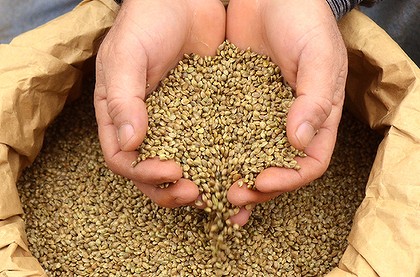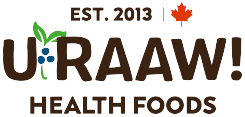Hemp seed is one of the most powerful and nutritious super-foods on the planet. The seeds can be consumed in their whole form, hulled (with the outer shell removed), as hemp protein powder, or as oil. Hemp packs a powerful nutritional punch no matter which way you choose to consume it.
In this post we interview Agi Wojdyla, one of the directors of Chi Hemp Industries Inc. (CHII) headquartered in Victoria, British Columbia Canada. CHII has been involved in the hemp industry since 1998, and knows everything you’d ever want to know about hemp. We met Agi when searching for hemp ingredients to use in our custom energy bars, trail mixes and smoothie mixes.
Here are his answers to 10 common questions about about Canadian hemp seed and hemp products. If there are any questions that we missed, please leave a comment at the bottom of this post.
Q: How did CHII get involved in hemp farming?
A: The founder of CHII iscovered hemp food when he was in search for a vegetarian protein. Since milk products never agreed with his system, soy or whey protein were not an ideal source. Finally after discovering hemp the miracle protein source was found.
Q: What Canadian provinces produce the majority of hemp and why?
A: Hemp is grown primarily in the prairie provinces of Canada (Alberta, Saskatchewan and Manitoba). The climate and soil conditions here make it ideal for hemp crops to thrive, as hemp requires nutrient rich soil with controlled water flow.
Q: When, and how is hemp harvested?
A: Hemp is harvested in October. The hemp plants are cut just above the soil and cut hemp is left to dry on the ground. This is followed by retting (a process where moisture, micro-organisms or chemistry break down the bark tissue that binds the fiber and non fiber portions together making them east to separate) and then mechanical separation of the fiber from the seed using modern processes and machines.
Q: How does the quality of Canadian hemp compare to hemp in other parts of the world?
A: The type of hemp crops that are grown in Canada are of a specific variety of the Cannabis Sativa L. plant and differs from what is grown in other parts of the world. Each hemp variety has its own set of characteristics; small or large seed, low or high oil content, different oil composition etc. Generally speaking the hemp seed from Canada is very high quality, nice large size seed with full body, generous oil content and wonderful flavor.
Q: What is the difference between organic and non-organic hemp products?
A: Our naturally produced hemp foods are processed in the same manner as the certified organic hemp food we offer. None of the hemp food we supply is sprayed with pesticides, herbicides, fungicides, insecticides or fertilizers. Our conventional hemp food should really be called “eco-farmed” because the main difference between the ways our organic crops are treated versus conventional crops is the use of pre-emergent herbicide/commercial fertilizer.
Q: What else is hemp used for other than human consumption?
A: Hemp has many uses. Hemp fiber can be used for hemp textiles, paper, rope, jewelry, and various building materials such as fiberboard and insulation. Hemp oil has many industrial uses such as biofuels (bio-diesel and alcohol fuel), plastics or can be used to make various body care products.
Q: What is the environmental impact of growing and cultivating hemp?
A: Hemp is considered to be environmentally friendly and has been grown for millennia in Asia and the Middle East for its fiber. Commercial production of hemp in the West took off in the eighteenth century. High yield hemp crops require similar nutrient levels to that of high yield wheat crops.
Q: What are the benefits of hemp protein powder over other vegetable sources such as brown rice protein and pea protein?
A: Hemp seed contains an excellent source of protein. With hemp seed having more than 25% of the total seed weight as protein, it is second only to Soy in protein content. Hemp seed also has all 20 known amino acids including the 9 essential amino acids, making hemp seed a perfect protein providing all the amino acids that your body needs.
Pea protein and rice protein do not have a complete amino acid profile like hemp. Hemp protein is also made up of approximately 65% Edestine and 35% Albumin as protein types. Edestine is considered the most digestible protein because of its closeness to the structure of protein found in human blood.
Edestine is also the backbone of cell DNA. Albumin is most commonly known as the protein found in egg whites. Hemp protein is also free of the sugars found in Soy, oligosaccharides, that cause flatulence and stomach discomfort.
Q: Besides Canada, what other countries have you sold your hemp products to? Is there high demand worldwide?
A: We currently primarily deal with North American customers only, however the hemp industry is growing and there is a high demand for hemp products worldwide. We hope to get involved internationally in the future.
Q: Some hemp plants are grown to produce marijuana. What is the difference between those and the plants you grow?
A: Technically hemp and marijuana both come from the same plant – Cannabis Sativa L. The term ‘hemp’ commonly refers to the industrial/commercial use of the cannabis stalk and seed for textiles, foods, papers, body care products, detergents, plastics and building materials. Industrial hemp is made up of specific varieties of the Cannabis Sativa L. plant that contain less than 0.3% Tetrahydrocannabinol (THC). Marijuana contains about 5% – 10% or more THC and is of a completely different variety.
At U-RAAW! all of the hemp products we carry (hemp seeds, hearts, and protein powder) come exclusively from CHII. To learn more about their company and products, please visit CHII Hemp Industries on the web.
Do you consume hemp products on a regular basis? Have any other questions about hemp that weren’t answered here? Please let us know by leaving a comment below!


Does hemp seed contain estrogen? We have heard that men shouldn’t consume hemp seed due to
the level of estrogen it contains.
Thank you.
Hi Terry,
No, in fact they have the opposite affect. The plant sterols are anti-estrogenic.
Regards,
Adam
I was just woundering if you knew anything about the hemp protein powder ?
What is it made up of ?
Does the shell of the seed contain any protein ?
Hi Jay,
Hemp protein powder is simply made of finely ground hemp hearts / seeds. The shell is almost all fiber I believe, and you will notice that the fiber content of hemp protein will range from around 30-70% depending on the blend.